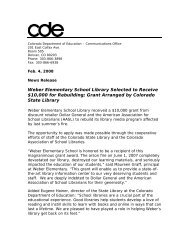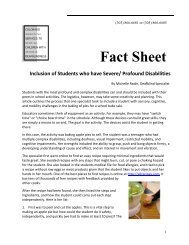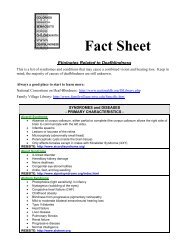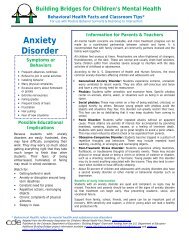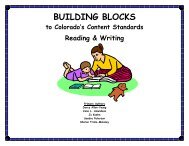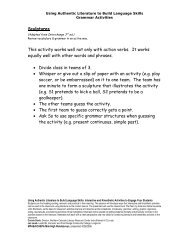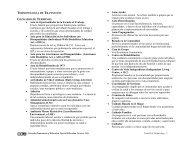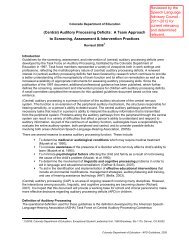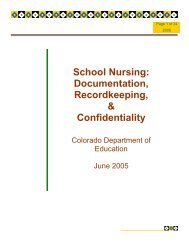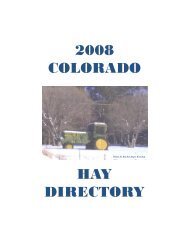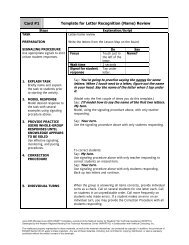ONLINE EDUCATION INTERIM REPORT - Colorado Department of ...
ONLINE EDUCATION INTERIM REPORT - Colorado Department of ...
ONLINE EDUCATION INTERIM REPORT - Colorado Department of ...
You also want an ePaper? Increase the reach of your titles
YUMPU automatically turns print PDFs into web optimized ePapers that Google loves.
4<br />
be examined within <strong>Colorado</strong>’s policy and fi scal<br />
context: strong local control, a long tradition<br />
<strong>of</strong> public school choice, and the implications<br />
<strong>of</strong> constitutional and statutory provisions for<br />
education funding, are among the contextual<br />
factors we considered and discussed in this report.<br />
Online education has many unique benefi ts, such<br />
as identifying and providing remedial education<br />
for students who are behind; meeting a variety<br />
<strong>of</strong> student learning needs and paces; providing<br />
a unique way <strong>of</strong> building teacher-student<br />
relationships; fostering fl exible ways to learn;<br />
strengthening students’ knowledge <strong>of</strong> technology,<br />
and emphasizing personal responsibility.<br />
However, at the same time, online education also<br />
faces some unique challenges: building social<br />
skills and peer relationships; less direct teacherstudent<br />
interaction and supervision; recruitment,<br />
retention and evaluation <strong>of</strong> online teachers; and<br />
coordination with students’ school districts <strong>of</strong><br />
residence.<br />
Accountability is at the front and center <strong>of</strong> reform<br />
efforts in education, and the task force agreed<br />
that, like all public schools, online schools<br />
must comply with appropriate procedures in the<br />
administration <strong>of</strong> public funds as well as with<br />
all applicable education, health, safety, and<br />
civil rights laws. Accountability for academic<br />
growth, operational accountability, and fi scal<br />
accountability are essential for ensuring high<br />
quality educational services, serving the public<br />
interest, and promoting the sector’s health. Of<br />
course, public school choice <strong>of</strong>fers another layer<br />
<strong>of</strong> accountability for<br />
alternative forms<br />
<strong>of</strong> education, since<br />
low quality will<br />
lead parents and<br />
students to “vote<br />
with their feet.” To<br />
ensure accountability,<br />
policymakers may<br />
need to adjust<br />
existing oversight<br />
structures, clarify<br />
how to apply existing procedures and provide<br />
additional resources to strengthen the oversight<br />
<strong>of</strong> alternative programs like online education.<br />
In terms <strong>of</strong> access, the task force discussed<br />
various barriers, and most importantly, the state’s<br />
restriction <strong>of</strong> funding for students previously<br />
enrolled in physical schools. This restriction<br />
may be limiting access to online education for<br />
dropouts or those likely to drop out, effectively<br />
preventing a potential remedy to the students<br />
who are most likely to benefi t from the online<br />
education option. The task force recommends<br />
that the legislature remove the statutory denial<br />
<strong>of</strong> public funding for students who were not<br />
enrolled in public school in the previous year.<br />
Moreover, the task force supports expanding<br />
geographic access to online education through<br />
telecommunication infrastructure investments<br />
that will enhance educational opportunities and<br />
options throughout the state. In addition, we<br />
recommend that the state examine how supportive<br />
learning environments for at-risk students<br />
engaged in online learning, such as learning<br />
centers, can be encouraged, revisit its defi nition <strong>of</strong><br />
a “complete educational program,” and clarify how<br />
to apply this term in the context <strong>of</strong> online learning<br />
and learning centers while promoting innovation.<br />
<strong>Colorado</strong> online schools are funded at a lower<br />
amount than physical schools. The lower online<br />
school funding can discourage districts from<br />
establishing full-time programs even if they might<br />
best serve a student’s needs. School districts<br />
have a disincentive to see a signifi cant number<br />
<strong>of</strong> students choose online schools because<br />
their overall funding declines. At the same time,<br />
smaller school districts have an incentive to<br />
set up online schools that draw students from<br />
across the state, regardless <strong>of</strong> the reduced PPR,<br />
because the school raises revenues that the<br />
district would otherwise not have. The task<br />
force recommends that the online PPR becomes<br />
equal to the state average rather than the state<br />
minimum, or determine a constant and reasonable<br />
amount <strong>of</strong> state funding for online students<br />
regardless <strong>of</strong> their district <strong>of</strong> residence. Further




